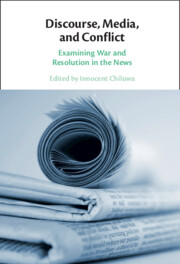Book contents
- Discourse, Media, and Conflict
- Discourse, Media, and Conflict
- Copyright page
- Contents
- Figures
- Tables
- About the Authors
- Foreword
- Introduction
- Part I Conflict Discourse in Newspaper Reporting
- Part II Electronic Media and Online Discourses of Conflict
- Part III Media Discourse and Conflict Resolution
- 10 The Language of Peace in Conflict Transformation
- 11 The Historical Context in Media Narratives in Search of Peaceful Resolution to the Israel–Palestine Conflict
- 12 From Peace Talks to Military Operation
- 13 From Collision to Diplomatic Compromise
- 14 Constructing Identities in Crisis Situations
- Conclusion
- Index
- References
14 - Constructing Identities in Crisis Situations
A Study of the “Volunteer” in the Spanish and English Press
from Part III - Media Discourse and Conflict Resolution
Published online by Cambridge University Press: 21 April 2022
- Discourse, Media, and Conflict
- Discourse, Media, and Conflict
- Copyright page
- Contents
- Figures
- Tables
- About the Authors
- Foreword
- Introduction
- Part I Conflict Discourse in Newspaper Reporting
- Part II Electronic Media and Online Discourses of Conflict
- Part III Media Discourse and Conflict Resolution
- 10 The Language of Peace in Conflict Transformation
- 11 The Historical Context in Media Narratives in Search of Peaceful Resolution to the Israel–Palestine Conflict
- 12 From Peace Talks to Military Operation
- 13 From Collision to Diplomatic Compromise
- 14 Constructing Identities in Crisis Situations
- Conclusion
- Index
- References
Summary
Refugee crises around the world, especially the recent European migrant crisis, have highlighted the importance of the work done by volunteers. Drawing on a corpus-assisted discourse study (CADS) approach and based on a comparable corpus of English and Spanish newspaper articles, this chapter examines the construction of the volunteer identity through language use in the press by combining quantitative corpus techniques and qualitative methods. Among other findings, the results indicate a humanitarian discourse in which volunteerism is constructed as a helping activity.
- Type
- Chapter
- Information
- Discourse, Media, and ConflictExamining War and Resolution in the News, pp. 324 - 338Publisher: Cambridge University PressPrint publication year: 2022
References
- 2
- Cited by



